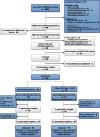A web-based intervention (RESTORE) to support self-management of cancer-related fatigue following primary cancer treatment: a multi-centre proof of concept randomised controlled trial
- PMID: 26643072
- PMCID: PMC4846690
- DOI: 10.1007/s00520-015-3044-7
A web-based intervention (RESTORE) to support self-management of cancer-related fatigue following primary cancer treatment: a multi-centre proof of concept randomised controlled trial
Abstract
Purpose: Cancer-related fatigue (CRF) is a frequent and distressing symptom experienced after cancer treatment. RESTORE is the first web-based resource designed to enhance self-efficacy to manage CRF following curative-intent treatment. The aim of this study is to test the proof of concept and inform the design of an effectiveness trial.
Methods: A multi-centre parallel-group two-armed (1:1) exploratory randomised controlled trial (RCT) with qualitative process evaluation was employed in the study. Participants (≥18 years; ≤5 years post treatment with moderate to severe fatigue) were recruited and randomly assigned to RESTORE or a leaflet. Feasibility and acceptability were measured by recruitment, attrition, intervention adherence, completion of outcome measures and process evaluation. Change in self-efficacy to manage CRF was also explored. Outcome measures were completed at baseline (T0), 6 weeks (T1) and 12 weeks (T2). Data were analysed using mixed-effects linear regression and directed content analysis.
Results: One hundred and sixty-three people participated in the trial and 19 in the process evaluation. The intervention was feasible (39 % of eligible patients consented) and acceptable (attrition rate 36 %). There was evidence of higher fatigue self-efficacy at T1 in the intervention group vs comparator (mean difference 0.51 [-0.08 to 1.11]), though the difference in groups decreased by 12 weeks. Time since diagnosis influenced perceived usefulness of the intervention. Modifications were suggested.
Conclusion: Proof of concept was achieved. The RESTORE intervention should be subject to a definitive trial with some adjustments. Provision of an effective supportive resource would empower cancer survivors to manage CRF after treatment completion.
Trial registration: ISRCTN67521059.
Keywords: Cancer; Fatigue; Intervention; Self-management; Web-based.
Similar articles
-
RESTORE: an exploratory trial of an online intervention to enhance self-efficacy to manage problems associated with cancer-related fatigue following primary cancer treatment: study protocol for a randomized controlled trial.Trials. 2013 Jun 21;14:184. doi: 10.1186/1745-6215-14-184. Trials. 2013. PMID: 23786716 Free PMC article. Clinical Trial.
-
RESTORE: an exploratory trial of a web-based intervention to enhance self-management of cancer-related fatigue: findings from a qualitative process evaluation.BMC Med Inform Decis Mak. 2015 Nov 14;15:94. doi: 10.1186/s12911-015-0214-y. BMC Med Inform Decis Mak. 2015. PMID: 26577690 Free PMC article. Clinical Trial.
-
Protocol for a pilot randomised controlled trial of an online intervention for post-treatment cancer survivors with persistent fatigue.BMJ Open. 2016 Jun 10;6(6):e011485. doi: 10.1136/bmjopen-2016-011485. BMJ Open. 2016. PMID: 27288384 Free PMC article. Clinical Trial.
-
Telephone interventions for symptom management in adults with cancer.Cochrane Database Syst Rev. 2020 Jun 2;6(6):CD007568. doi: 10.1002/14651858.CD007568.pub2. Cochrane Database Syst Rev. 2020. PMID: 32483832 Free PMC article.
-
Electronic self-reporting of adverse events for patients undergoing cancer treatment: the eRAPID research programme including two RCTs.Southampton (UK): NIHR Journals Library; 2022 Feb. Southampton (UK): NIHR Journals Library; 2022 Feb. PMID: 35138783 Free Books & Documents. Review.
Cited by
-
Digital Health Psychosocial Intervention in Adult Patients With Cancer and Their Families: Systematic Review and Meta-Analysis.JMIR Cancer. 2024 Feb 5;10:e46116. doi: 10.2196/46116. JMIR Cancer. 2024. PMID: 38315546 Free PMC article. Review.
-
Assessment of the psychometric properties of the traditional Chinese version of the cancer survivors' self-efficacy scale.Psicol Reflex Crit. 2024 Aug 23;37(1):33. doi: 10.1186/s41155-024-00317-y. Psicol Reflex Crit. 2024. PMID: 39177718 Free PMC article.
-
The cancer patients' perspective on feasibility of using a fatigue diary and the benefits on self-management: results from a longitudinal study.Support Care Cancer. 2022 Dec;30(12):10213-10221. doi: 10.1007/s00520-022-07397-5. Epub 2022 Oct 13. Support Care Cancer. 2022. PMID: 36227505 Free PMC article.
-
Self-management interventions for cancer survivors: a systematic review.Support Care Cancer. 2018 May;26(5):1585-1595. doi: 10.1007/s00520-017-3999-7. Epub 2017 Dec 4. Support Care Cancer. 2018. PMID: 29199362
-
mySmartCheck, a Digital Intervention to Promote Skin Self-examination Among Individuals Diagnosed With or at Risk for Melanoma: A Randomized Clinical Trial.Ann Behav Med. 2022 Aug 2;56(8):791-803. doi: 10.1093/abm/kaab090. Ann Behav Med. 2022. PMID: 34637495 Free PMC article. Clinical Trial.
References
-
- World Cancer Research Fund/American Institute for Cancer Research . Food, nutrition, physical activity, and the prevention of cancer: a global perspective. Washington DC: AICR; 2007.
Publication types
MeSH terms
Grants and funding
LinkOut - more resources
Full Text Sources
Other Literature Sources
Medical


